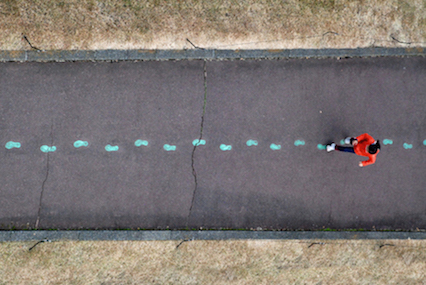In week 2 of EDCI 136, we learned about digital citizenship how to be an online citizen who is responsible, safe, and purposeful. I think one of the biggest observations I made was that every time we click on the internet, we’re contributing to creating our digital footprint posting something on social media, filling out a form, or even proving that we’re human with a CAPTCHA.
Guest speaker Jesse Miller’s talk made me think about how much I am sharing online without even realizing it. We believe AI is all-knowing, but the truth is we are actually training it to work all the time sometimes without even knowing it.
From searching my name on the internet to understanding how AI learns from our daily habits, this week made me more attuned to how I interact with technology and how I can better control my online identity.
What I Discovered When I Googled Myself
One of the tasks this week was to search my name on the web and look for what comes up. I was not surprised at not finding a lot, but here is what I did find:
What I Found:
There were some social media profiles readily available.
Some of the past accounts I had forgotten about still came up.
My professional and educational presence was thin which I need to rectify.
Key Takeaways from This Activity:
Check privacy controls on all social media platforms.
Close or remove old accounts to reduce my digital footprint.
Start building a professional online presence (e.g., LinkedIn, GitHub).
How AI Basks in Our Everyday Activities to Learn
Jesse Miller gave some great insights into how AI models learn from us specifically through such as CAPTCHA tests.
CAPTCHA Tests: They Do More Than Protect From Security
Whenever we prove “I’m not a robot” and click on images containing stop signs, fire hydrants, or crosswalks, we are basically: 1.Training AI to recognize objects of the real world (employed in self-driving cars, security systems, etc.).
2. Supplying large companies (Toyota & Mercedes, for example) with feeding information so they may develop better AI for self-driving vehicles.
3. Aiding AI to make decisions subconsciously.
What This Signifies for Future AI:
Driverless cars, within 10-15 years, will:
1. Have 360-degree cameras giving a full vision of the scene.
2. Speak mathematically with each other so that they might avoid accidents.
3. Be making decisions based on data instead of human judgment.
But AI is not perfect it only learns what we teach it. For example, Jesse shared with us that there was a fire hydrant painted Minion color. AI would not necessarily know because it was trained on red fire hydrants and nothing else.
Reflection: This made me question how many other things in our day-to-day lives are being affected by AI, even when AI does not necessarily understand context?
Final Thoughts: Why Digital Citizenship Matters
This week put me more in tune with how all that I do online has a lasting effect. Whether it’s:
1. Controlling my own digital footprint by managing privacy settings.
2. Understanding how AI is trained from human interactions.
3. Learning how companies gather and use our information.
It matters to be aware, guard my online identity, and think critically about how technology dictates our future.
